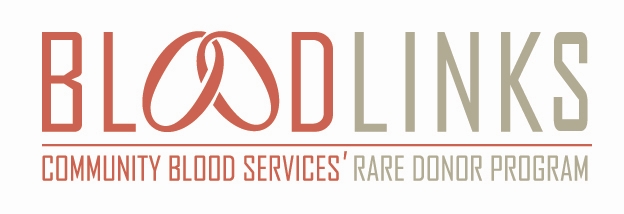 |

Patients with blood disorders who require continual blood transfusions often develop antibodies to certain proteins found in blood products and need special, uniquely matched units for transfusion. Community Blood Services'
Immunohematology and Platelet Reference laboratories are staffed with highly trained and knowledgeable laboratory scientists and technical experts who assist hospital transfusion specialists in finding individuals who match the special needs of these patients.
Our BloodLinks rare donor program maintains a vast inventory of specially and extensively typed blood from diverse donors in our community which it provides to our community hospitals to help seriously ill patients requiring transfusions.
����How do you identify BloodLinks donors?If it�s been determined that a donor�s blood has a combination of unique antigens or lack of specific antigens that will match, they will receive a letter with a blue tag identifying them as a BloodLinks donor. We encourage them to donate on a routine basis to help maintain our inventory and ensure their special blood type is always there should a hospital request it for a patient need it. When scheduling their appointments, these donors are asked to identify themselves as "BloodLinks" donors so their donated blood can be tagged and labeled accordingly. ����What is the difference between a BloodLinks� donor and a donor with another more common blood type?For blood transfusions, patients are matched with donor blood based on their major blood groups, referred to as "ABO" and "Rh" blood types: O+ O- A+ A- B+ B- AB+ AB.
An estimated 5% of patients will need to find blood that is an even more specific match and lacks certain antigens against which the patient has developed antibodies. Providing incompatible blood for transfusions can cause life-threatening reactions.
Community Blood Services tests for the absence of such antigens, referred to as screening or testing for rare blood. We need blood donations from more multi-cultural donors to maintain a diverse inventory of antigen-negative blood. ����What exactly is an antigen?An antigen is simply a protein found on the surface of red blood cells. There are over 250 different antigens that can be recognized by the body�s immune system. ����Why is a donor's blood unique?Just like their hair and eye color were inherited from their parents, their unique (or rare) blood and its antigens were also inherited from their parents. That�s why, for example, it is very difficult to find a rare blood type needed for an African American patient that did not come from an African American donor. ����Why is it important for donors to indicate their ethnicity when they donate?Antigens are inherited traits. Therefore, the antigen match for an Asian patient will likely come from an Asian donor. Many of our hospital�s sickle cell patients need units that lack a combination of certain antigens or antigens that are common in other populations. Donors of African-American descent are more likely to have red cells lacking these mentioned antigens than any other donor populations. ����How do donors learn they have rare blood?We test from a pool of donors to determine antigen status. Since the testing is largely driven by patient and inventory needs, they may not find out they are rare donors the first time they donate but only after multiple donations. ����Once you have identified a donor for the BloodLinks rare donor program, what do you ask them to do?We ask them to contact our telerecruitment department to schedule your next donation. If possible, they are asked to bring their BloodLinks blue tag with them when they come in to donate and present it to their collections specialist. We remind them that they can donate blood every 56 days (up to six times a year) if they are feeling well and healthy, or every 111 days if they donate double red cells. And we remind them that the more frequently they are able to donate, the more lives they can help save! ����Should donors be worried that they have rare blood?Not at all, there is nothing wrong with their blood. We want them to be aware that their blood is special, however, and it may be difficult to find should they or someone else with the same rare antigens need a transfusion. ����Who might need rare blood?Patients who are regularly transfused, especially those with sickle cell disease, leukemia or thalassemia, can easily form antibodies (immune responses) to some red cell antigens. Once antibodies form, patients require very extensively and uniquely antigen-matched transfusions to prevent more antibodies. Others who require rare blood may include pregnant women, newborn infants, or patients undergoing chemotherapy. ����If a donor�s blood is so rare, why should he donate it at all?We urgently need these donors to help us maintain an adequate supply of their special, rare blood type for the patients who need it. Because their blood is special, it is specially marked and stored and held for anyone who needs it. Some donors may lack an antigen that 99% of the population has. Units from the latter type of donors will be processed for freezing and can be stored for years until someone needs it, including you. ����Should rare donors also donate platelets?It is very important that we collect rare donors� whole blood or red blood cells, although they may be able to make an automated collection where they can donate platelets and red cells all at the same time. The BloodLinks coordinator can help make those arrangements with the donor.
Please email us if you need additional information
or have questions about the BloodLinks program.
Melanie August, a Catholic University College student from North Bergen, NJ
is a Bloodlinks rare donor. Melanie makes a difference every time
she makes a special, lifesaving donation!
|
|